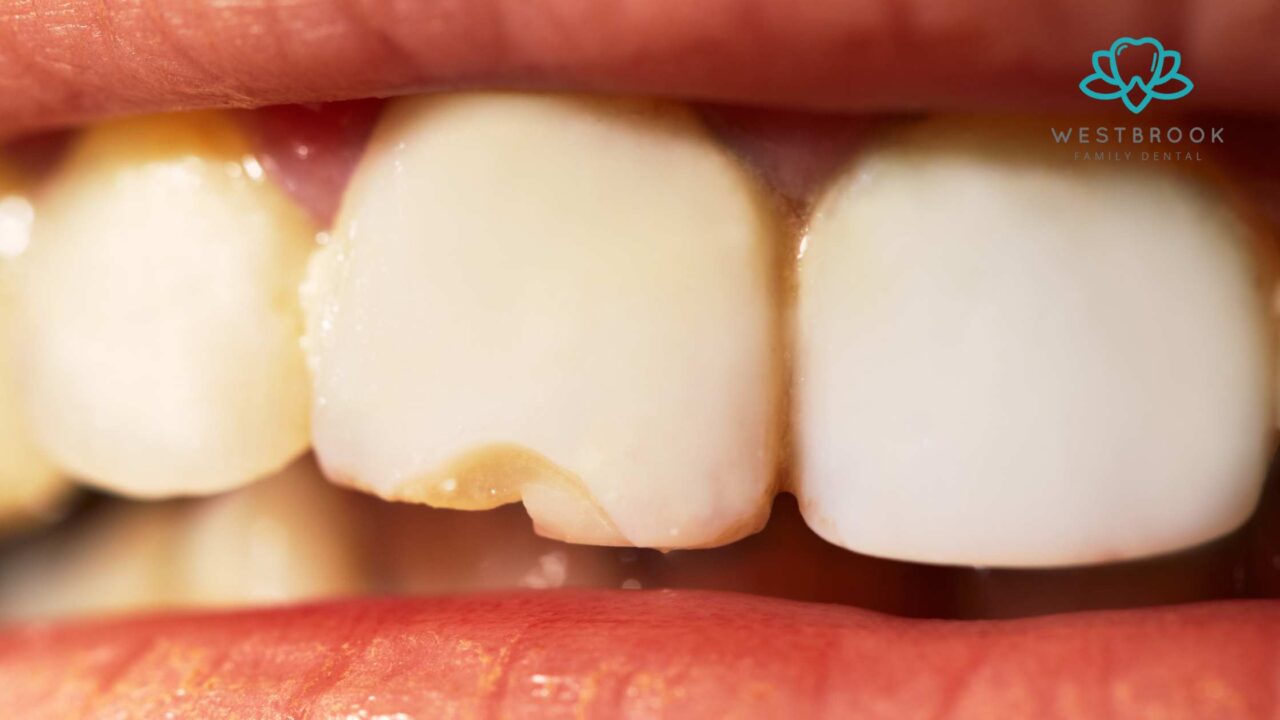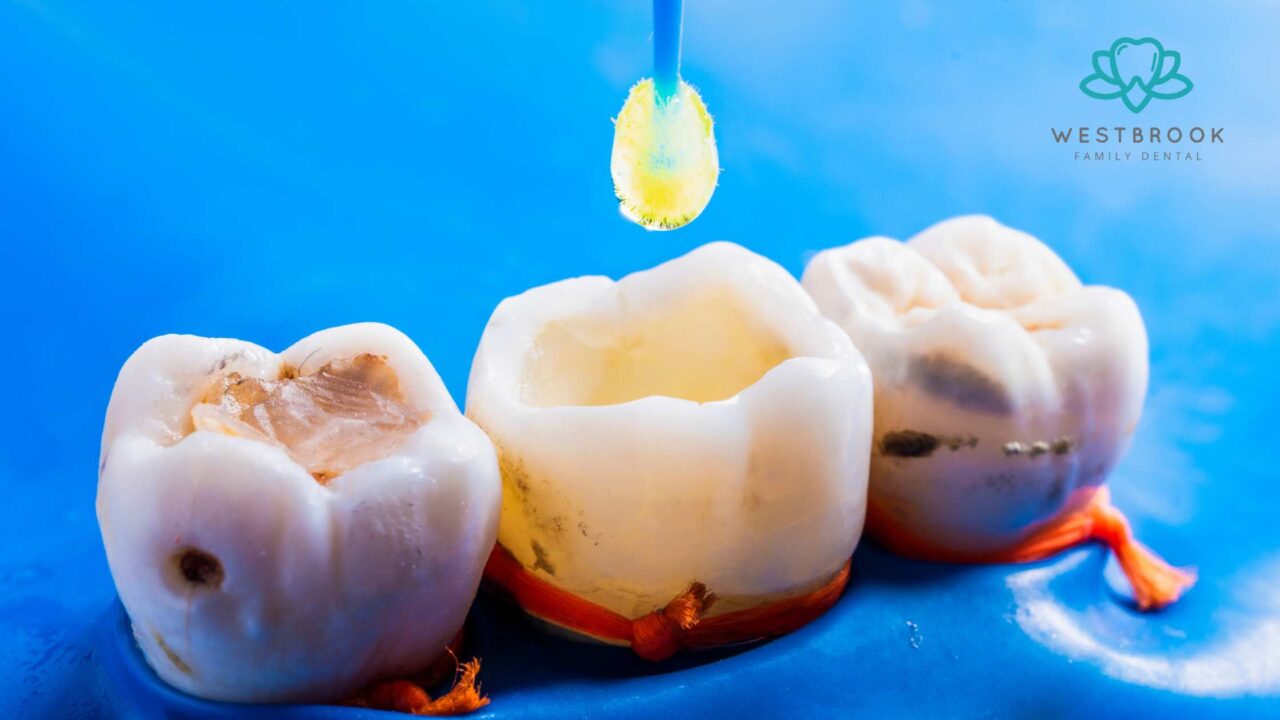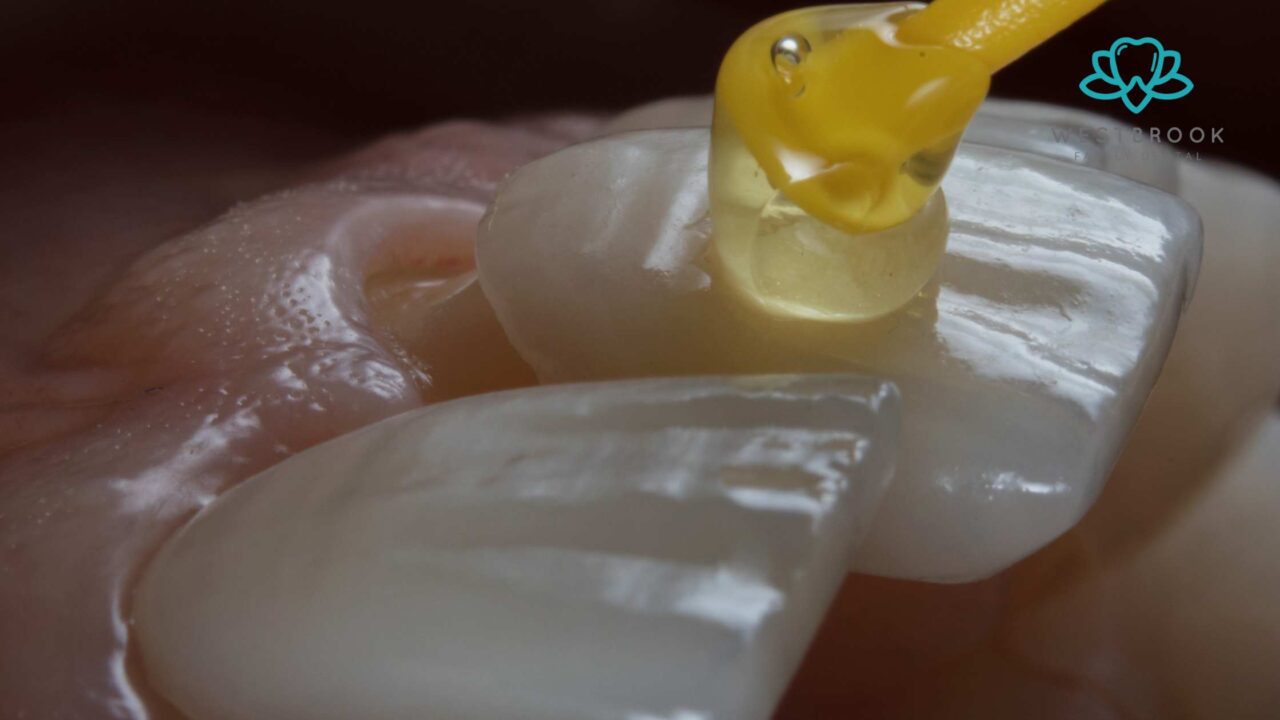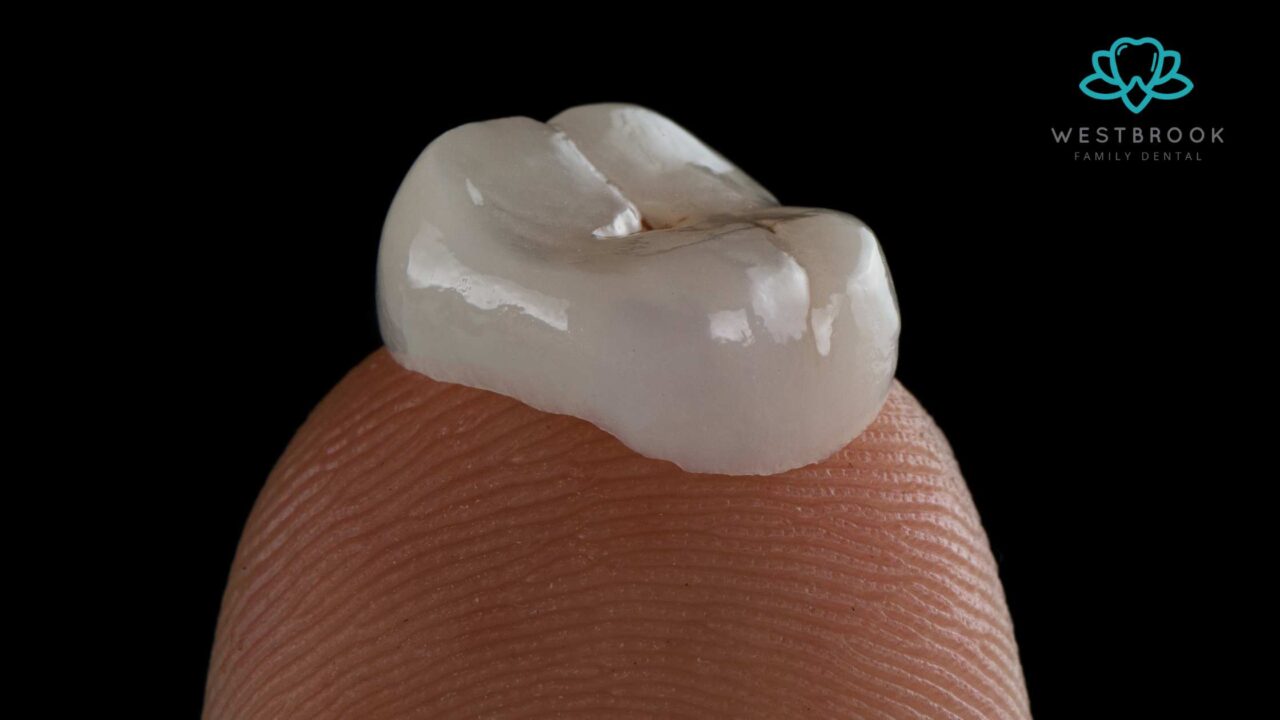At Westbrook Family Dental, we understand that a chipped tooth can cause more than just discomfort. It can impact your confidence, make eating difficult, and in some cases, pose a threat to your overall oral health. Whether you’ve chipped a tooth from an accident, while eating something hard, or due to general wear and tear, there are multiple ways to restore the appearance and functionality of your smile.
A customized treatment plan is essential because no two chipped teeth are the same, and each patient’s situation requires individual consideration. In this comprehensive guide, we’ll discuss the importance of treating a chipped tooth, the best available treatment options, how to decide which one is right for you, and how to prevent future damage.
Why Is It Important to Treat a Chipped Tooth?

Chipped teeth may seem like a minor issue, especially if the damage is small, but the consequences of leaving a chipped tooth untreated can be more significant than you might think. Here’s why addressing a chipped tooth promptly is essential.
- Aesthetic Concerns: A chipped tooth can affect the overall appearance of your smile, especially if it is a front tooth. This may cause self-consciousness or hesitation to smile or speak openly in social situations.
- Tooth Sensitivity: The enamel of your tooth protects the softer, more sensitive layers beneath. When the enamel is chipped, the dentin or pulp may be exposed, leading to increased sensitivity, especially to hot and cold temperatures.
- Further Damage: A small chip can often lead to more significant damage if left untreated. The chip may expand into a larger crack or break, requiring more complex and costly procedures to repair.
- Risk of Infection: If the inner layers of the tooth are exposed due to the chip, bacteria can easily enter and cause infection. This could lead to painful abscesses or the need for a root canal.
- Imbalance in Bite: Even a small chip can throw off your bite, leading to issues such as jaw pain, headaches, or excessive wear on surrounding teeth.
What Are the Most Common Customized Treatment Options for a Chipped Tooth?
When it comes to repairing a chipped tooth, there isn’t a one-size-fits-all solution. The best treatment depends on the size and location of the chip, the health of the surrounding teeth, and your aesthetic goals. At Westbrook Family Dental, we offer a variety of customized treatments designed to restore the appearance and strength of your tooth.
Here are the most common treatment options for a chipped tooth:
- Dental Bonding: Ideal for small to medium chips, bonding is one of the most affordable and quickest solutions. A composite resin material is applied to the chipped area and sculpted to match the natural shape of your tooth. The resin is then hardened with a special light.
- Advantages of Dental Bonding:
- Quick and usually completed in one visit.
- Minimally invasive and requires little to no tooth preparation.
- Affordable compared to veneers or crowns.
- Blends seamlessly with the natural tooth structure.
- Disadvantages:
- Bonding may not last as long as other treatment options (typically 5-10 years).
- The material can stain over time, especially if you frequently consume coffee, tea, or red wine.
- Disadvantages:
- Advantages of Dental Bonding:
- Dental Veneers: Veneers are thin, custom-made porcelain shells that cover the front of the tooth. They’re an excellent option if the chip is visible when you smile or if you want to enhance the appearance of your teeth. Veneers are durable and can address not just chips but also discoloration or unevenness.
- Advantages of Veneers:
- Long-lasting (can last up to 15 years with proper care).
- Resist staining better than bonding materials.
- Provide a highly aesthetic and natural appearance.
- Disadvantages:
- More expensive than bonding.
- Requires some removal of the natural enamel for proper placement.
- Veneers are irreversible once placed.
- Advantages of Veneers:
- Dental Crowns: If the chip is large or affects the structural integrity of the tooth, a crown may be the best solution. A crown covers the entire tooth, providing strength and protection while restoring the tooth’s appearance. Crowns are especially useful for back teeth, where more pressure is applied during chewing.
- Advantages of Crowns:
- Protects and strengthens the entire tooth.
- Highly durable and long-lasting (can last up to 20 years).
- Made from various materials such as porcelain, metal, or a combination.
- Disadvantages:
- Requires more tooth preparation than bonding or veneers.
- Can be more expensive depending on the material used.
- Advantages of Crowns:
- Root Canal and Crown: If the chip is deep enough to expose the tooth’s pulp, a root canal may be required to remove the infected or damaged tissue. Afterward, a crown is placed to restore the tooth’s function and appearance.
- Advantages:
- Prevents the need for extraction by saving the tooth.
- Combines protection with aesthetic restoration.
- Disadvantages:
- Involves a more complex procedure than bonding or veneers.
- Higher cost due to the combination of treatments.
- Advantages:
- Filling: For small chips, especially in molars, a simple filling may be sufficient to restore the tooth’s structure and function. Fillings are typically made from composite resins that match the color of your teeth.
- Advantages:
- Cost-effective and quick to apply.
- A good option for small, non-visible chips.
- Disadvantages:
- May not be suitable for larger chips or visible teeth.
- Can wear down faster than crowns or veneers.
- Advantages:
How Does Dental Bonding Work for Chipped Teeth?

Dental bonding is one of the simplest and least invasive treatments for chipped teeth. The process is straightforward, and it can be completed in one visit, making it an ideal choice for busy patients looking for a quick solution.
- Step-by-Step Process:
- Preparation: Your dentist will select a resin color that matches your natural tooth.
- Application: The composite resin is applied to the chipped area and sculpted to fit the tooth’s shape.
- Hardening: A special UV light is used to harden the resin.
- Polishing: Once the resin is hard, the dentist will polish the tooth to ensure it matches the sheen of your natural teeth.
- Benefits of Bonding:
- Painless procedure, usually requiring no anesthesia.
- Fast and can be completed in a single appointment.
- Minimal alteration to your natural tooth structure.
- Longevity and Maintenance: While bonding can last several years, it’s essential to care for it properly by avoiding habits like chewing ice or biting nails, as these can wear down the resin faster.
When Are Dental Veneers the Best Option?

Veneers are often the go-to choice for patients who want a long-lasting, aesthetic solution for chipped teeth. They’re particularly beneficial if the chip is in one of your front teeth or if you’re looking to enhance the overall appearance of your smile.
- Who Are Veneers Suitable For?: Veneers are ideal for those who want a cosmetic solution for chips, discoloration, or slight misalignments. They’re also perfect for people who want a permanent fix that doesn’t require frequent maintenance.
- What Is the Veneer Process?:
- Consultation: Your dentist will discuss your goals and take impressions of your teeth.
- Preparation: A small amount of enamel is removed from the tooth to make room for the veneer.
- Impression and Fabrication: Impressions are sent to a dental lab where your custom veneers are created.
- Application: Once ready, the veneers are bonded to your teeth with dental cement and cured with a light.
- Advantages Over Bonding:
- Veneers last longer and resist staining better than composite bonding.
- They provide a more natural and flawless look, especially for front teeth.
- Common Concerns: While veneers are an excellent long-term solution, they do require some enamel removal, making the procedure irreversible. Additionally, the cost is higher than bonding, but the results are more durable and aesthetically superior.
Why Might You Need a Dental Crown for a Chipped Tooth?

If the chip in your tooth is severe, especially in a back tooth (molar), a crown may be the best solution. Crowns provide full coverage of the tooth and restore both its appearance and function.
- Who Needs a Crown?: Crowns are typically recommended when a large portion of the tooth is missing or when the tooth’s structure is compromised. This is common in molars that have been chipped due to biting down on something hard or from trauma.
- Different Types of Crowns:
- Porcelain Crowns: Perfect for front teeth as they blend seamlessly with your natural tooth color.
- Metal Crowns: Used for back teeth due to their strength, but they don’t match the tooth’s natural color.
- Porcelain-Fused-to-Metal Crowns: Offers the strength of metal and the aesthetics of porcelain, making them versatile for both front and back teeth.
- Process for Getting a Crown:
- Preparation: Your dentist will remove any damaged tissue and shape the remaining tooth.
- Temporary Crown: A temporary crown may be placed while your permanent crown is made.
- Placement: Once the permanent crown is ready, it’s cemented in place and adjusted for a perfect fit.
- Advantages of Crowns:
- Durable and long-lasting, often lasting 10-20 years.
- Restores the full function of the tooth, allowing you to bite and chew without worry.
- Provides full protection against further damage.
- Maintenance: Crowns require the same care as your natural teeth—brushing twice a day, flossing, and regular dental checkups.
How Do You Decide Which Treatment Option Is Best for You?
Choosing the right treatment for your chipped tooth depends on several factors, including the size and location of the chip, your aesthetic preferences, and your budget. Your dentist at Westbrook Family Dental will help you make an informed decision during your consultation.
- Factors to Consider:
- Size of the Chip: Minor chips can often be repaired with bonding, while more significant chips may require veneers or crowns.
- Location of the Tooth: Chips in visible front teeth are usually treated with veneers or bonding, while back teeth may require crowns for strength.
- Aesthetic Goals: If you’re concerned about the appearance of your smile, veneers offer the most natural-looking results.
- Budget: Bonding is the most cost-effective option, while veneers and crowns are more expensive but provide longer-lasting results.
- Consultation with Your Dentist: At Westbrook Family Dental, we’ll perform a thorough examination, including X-rays if necessary, to assess the damage and recommend the best treatment for your specific needs.
How to Prevent Future Chipped Teeth
Prevention is always better than cure, and while accidents happen, there are steps you can take to minimize the risk of chipping your teeth in the future.
- Avoid Chewing Hard Objects: Refrain from chewing on ice, hard candy, or using your teeth to open packages.
- Wear a Mouthguard: If you play contact sports, wearing a custom-fitted mouthguard can protect your teeth from trauma.
- Practice Good Oral Hygiene: Strong teeth are less likely to chip, so brush and floss regularly to maintain the strength of your enamel.
- Visit Your Dentist Regularly: Regular checkups at Westbrook Family Dental can catch any potential issues early before they become major problems.
- Limit Acidic Foods and Drinks: Acidic foods and drinks can weaken your enamel, making your teeth more prone to chipping.
Conclusion
At Westbrook Family Dental, we are committed to helping you find the best customized treatment option for your chipped tooth. Whether you choose dental bonding, veneers, or crowns, our experienced team will ensure you leave with a smile you love. Don’t wait for the problem to worsen—schedule a consultation today and discover how we can restore your tooth to its full function and beauty.
Common Questions About Chipped Tooth Treatments
Q: What should I do if I chip a tooth?
A: If you chip a tooth, it’s important to see a dentist as soon as possible. They can assess the damage and recommend the best course of action to fix a chipped tooth.
Q: What are the treatment options for a chipped or broken tooth?
A: Chipped tooth treatment options may include dental bonding, crowns, veneers, or in some cases, root canal therapy if the damage is severe. Your dentist will explain the best option based on your situation.
Q: How can I temporarily manage pain from a chipped tooth at home?
A: For minor discomfort, you can use over-the-counter pain relievers. However, it’s essential to see a dentist to address the underlying issue and avoid further damage.
Q: What happens if I ignore a chipped tooth?
A: Ignoring a chipped or broken tooth can lead to complications such as tooth decay or infection. This may require more extensive dental treatment, including root canal therapy or even tooth extraction.
Q: Is it possible to fix a chipped tooth at home?
A: While some minor chips can be managed temporarily, it’s not advisable to attempt to fix a chipped tooth at home permanently. It’s best to schedule an appointment with your dentist for proper tooth repair.
Q: How much does it cost to fix a chipped tooth?
A: The cost to fix a chipped tooth varies depending on the treatment required. Simple repairs like dental bonding may be less expensive than more complex procedures like crowns or root canals. Consult your dentist for an estimate.
Q: Can a chipped tooth lead to a root canal?
A: Yes, if a chipped tooth exposes the pulp or causes significant damage, the dentist may recommend root canal therapy to save the tooth and prevent infection.
Q: What are the signs that a chipped tooth may need extraction?
A: Signs that a chipped tooth may need extraction include severe pain, extensive decay, or if the tooth is too damaged to restore. Your dentist will evaluate the situation and recommend the best dental treatment.
Q: Can a dentist restore my smile after a chipped tooth?
A: Absolutely! A dentist can provide various tooth repair treatments, such as bonding or crowns, to restore your smile after a chipped or broken tooth.



